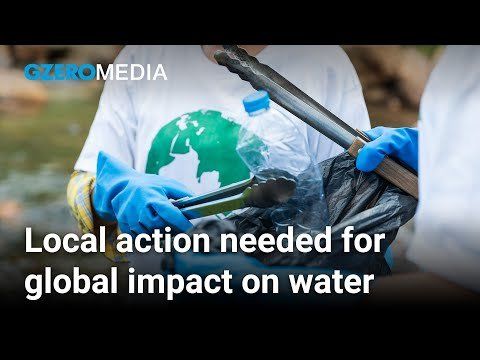You won't be surprised to hear that companies that make drinks need a lot of water. Suntory, one of the leading beverage producers in the world, is no exception. However, they have come up with an exceptional response to the issue, according to Shigeaki Kazama , Executive Officer and Division Deputy COO of the Sustainability Management Division at Suntory Holdings..
To offset the water Suntory draws from Japan's underground aquifers, they manage a vast system of forest preserves. They help recharge the resource by maintaining a cool, wet environment that allows groundwater to seep back into the earth rather than run off or evaporate.
"We now manage 22 forest areas that total over 12,000 hectares, which recharge twice the amount of groundwater that we take for our production in Japan," he said during a GZERO Live event organized by the Sustainability Leaders Council, a partnership between Eurasia Group, GZERO Media, and Suntory.
Watch the full livestream conversation: The global water crisis and the path to a sustainable future
- High and Dry: Tackling Global Water Stress ›
- The global water crisis and the path to a sustainable future - GZERO ... ›
- Hunger Pains: The growing global food crisis ›
- COP28’s challenge: growing problems, shrinking credibility ›
- Saving the planet is big business | Minoj Jain - GZERO Media ›
- The world is way behind on water policy | James Dalton - GZERO Media ›
- Why businesses are leapfrogging governments on water issues - GZERO Media ›
More For You
In this Quick Take, Ian Bremmer addresses the killing of Alex Pretti at a protest in Minneapolis, calling it “a tipping point” in America’s increasingly volatile politics.
Most Popular
Who decides the boundaries for artificial intelligence, and how do governments ensure public trust? Speaking at the 2026 World Economic Forum in Davos, Arancha González Laya, Dean of the Paris School of International Affairs and former Foreign Minister of Spain, emphasized the importance of clear regulations to maintain trust in technology.
Will AI change the balance of power in the world? At the 2026 World Economic Forum in Davos, Ian Bremmer addresses how artificial intelligence could redefine global politics, human behavior, and societal stability.
Ian Bremmer sits down with Finland’s President Alexander Stubb and the IMF’s Kristalina Georgieva on the sidelines of the World Economic Forum to discuss President Trump’s Greenland threats, the state of the global economy, and the future of the transatlantic relationship.
